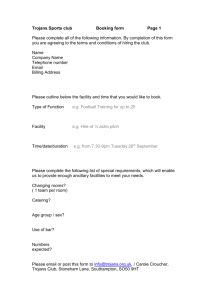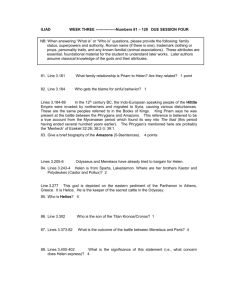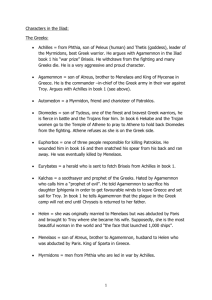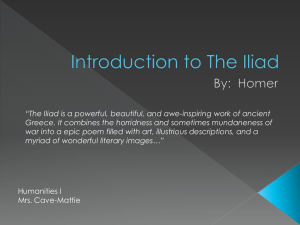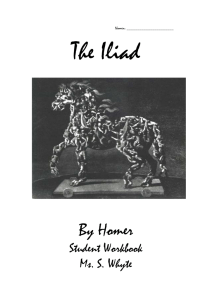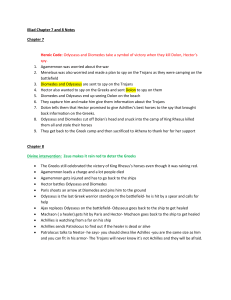Summary of the Iliad Book 16
advertisement
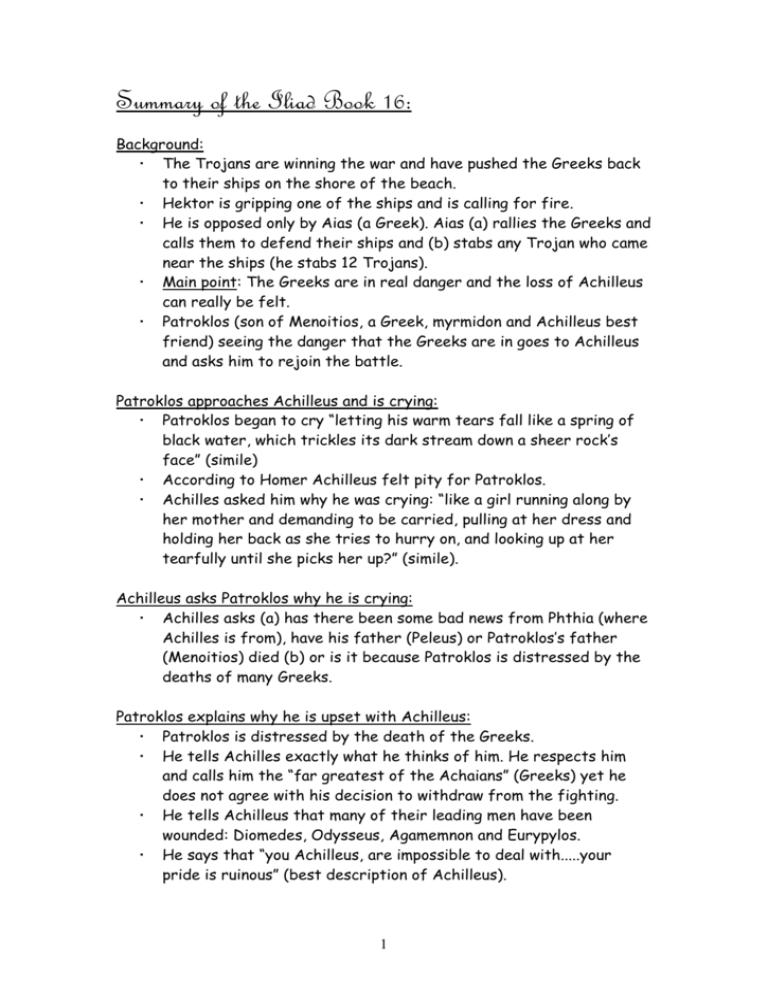
Summary of the Iliad Book 16: Background: The Trojans are winning the war and have pushed the Greeks back to their ships on the shore of the beach. Hektor is gripping one of the ships and is calling for fire. He is opposed only by Aias (a Greek). Aias (a) rallies the Greeks and calls them to defend their ships and (b) stabs any Trojan who came near the ships (he stabs 12 Trojans). Main point: The Greeks are in real danger and the loss of Achilleus can really be felt. Patroklos (son of Menoitios, a Greek, myrmidon and Achilleus best friend) seeing the danger that the Greeks are in goes to Achilleus and asks him to rejoin the battle. Patroklos approaches Achilleus and is crying: Patroklos began to cry “letting his warm tears fall like a spring of black water, which trickles its dark stream down a sheer rock’s face” (simile) According to Homer Achilleus felt pity for Patroklos. Achilles asked him why he was crying: “like a girl running along by her mother and demanding to be carried, pulling at her dress and holding her back as she tries to hurry on, and looking up at her tearfully until she picks her up?” (simile). Achilleus asks Patroklos why he is crying: Achilles asks (a) has there been some bad news from Phthia (where Achilles is from), have his father (Peleus) or Patroklos’s father (Menoitios) died (b) or is it because Patroklos is distressed by the deaths of many Greeks. Patroklos explains why he is upset with Achilleus: Patroklos is distressed by the death of the Greeks. He tells Achilles exactly what he thinks of him. He respects him and calls him the “far greatest of the Achaians” (Greeks) yet he does not agree with his decision to withdraw from the fighting. He tells Achilleus that many of their leading men have been wounded: Diomedes, Odysseus, Agamemnon and Eurypylos. He says that “you Achilleus, are impossible to deal with.....your pride is ruinous” (best description of Achilleus). 1 He calls Achilleus a “cruel man” for just sitting idly by as the Greeks die. He says that Achilleus’ parents mustn’t be Peleus and Thetis but the grey sea and stark cliffs. He means that Achilleus is very harsh, cold and unfeeling. Patroklos’s request to Achilleus: Patroklos asks Achilles for his armour so that he can pretend to be Achilles: “so the Trojans might take me for you and hold off their fighting, and the warrior sons of the Achaians gain relief in their weariness”. He hopes that the appearance of Achilles armour would scare the Trojans off. Homer reveals that this request will lead to Patroklos’s death. Achilleus agrees to give Patroklos his armour: Achilleus was annoyed by Patroklos’s speech and says that he was ill treated by Agamemnon who took his prize “as if I was some migrant without rights”. He agrees to let Patroklos wear his armour and lead the myrmidons (followers of Achilleus) into battle. He realises that this is necessary as “a black cloud of Trojans has settled round the ships in force”. Achilleus says that the Trojans are doing so well in battle because they have not seen his “helmet blazing” near them. He instructs Patroklos as follows: (a) “Fall on them with all your strength to keep destruction from the ships, so they do not put blazing fire to our ships and take away our longed –for return” (b) He tells Patroklos only to drive the fire from the ships but not to attack the city but to come back instead: “do not press on without me to fight the war- loving Trojans – that will reduce my worth. And do not lead your men on towards Ilios, slaughtering Trojans, in the delight of battle with the enemy or one of the ever – living gods from Olympos might come against you – Apollo the far – worker has much love for the Trojans”. Character of Achilleus: Proud/selfish/cruel/stubborn etc. 2 Character of Patroklos: By contrast to Patroklos is selfless/brave/caring/daring/noble etc. This is the behaviour that we would expect from Achilleus who is the leader of the Myrmidons. The Trojans set fire to the Greek ships and the Greeks retaliate (fight back): Aias could no longer hold the Trojans back. Hektor drove Aias back from the ships by striking at Aias’s spear and knocking the top off it. Aias was now out of range and the Trojans set fire to the Greek ships. Once the fire began Achilles instructed Patroklos to drive the Trojans back from the ships. Patroklos put on all of Achilleus’s armour except his spear as no other Greek except Achilles could wield (manage) it as it was massive. Patroklos told Automedon (myrmidon – friend and charioteer of Patroklos) to get the horses (immortal) Xanthos and Bailos and Pedasos (Achilles horse) He trusted Automedon “as he was the man he held in highest honour after Achilleus the breaker of men, and could trust most to follow his call in battle.” Achilleus gathers the myrmidons to fight against the Trojans: Achilles gathered the myrmidons who are compared to bloodthirsty wolves as they swarmed around Achilleus (simile). There were 50 ships of Achilles myrmidons and 50 myrmidons in each ship (2,500 myrmidons in total) and there were 5 men in command and Achilleus was in overall command of the ships. Leaders = Menesthios/Eudoros/Peisandros/Phoinix/Alkimedon. Achilleus instructs his myrmidons to fight with great courage against the Trojans. He reminds them that they have blamed Achilleus for detaining them from the battle saying: “Cruel son of Peleus, it was gall then that your mother nursed you on, pitiless man, keeping your companions in our seafaring ships, now that this wretched anger has lodged in your heart. Well now you have a great task before you, the battle you have been yearning for. So let us have men with courage in their hearts to fight the Trojans”. 3 Note: It is interesting that even the Myrmidons are fed up with Achilleus and think that he is cruel for not letting them fight. The myrmidons were packed closely together like the stones of a high wall that a man builds packed together (simile). Patroklos and Automedon are the two men who led the army (in Achilleus absence). Achilleus prayer to Zeus: 1. To send glory with Patroklos and strengthen the heart within him so that he can show Hektor what an excellent warrior he is. 2. When he has driven the clamour away from the ships then let him come back to the Greek ships unharmed. Zeus granted the first half of the prayer but he did not grant the second half of the prayer. The myrmidons join the battle: Patroklos and his men swarmed furiously out to the battle like wasps by the side of the road (simile). Patroklos rallied his troops and tried to inspire them with a speech saying that they should fight hard for Achilleus so that Agamemnon would realise how foolish he was to insult Achilleus. Note: Patroklos is extremely loyal to Achilleus yet Achilleus lets Patroklos go and fight knowing that there is a possibility that he might die. He lets Patroklos bear the brunt of the fighting. Patroklos and the Greeks slaughter many Trojans and drive the fire back from their ships: When Patroklos joins the fighting the Greeks manage to gain the upper hand in the battle. Homer calls Patroklos the “brave son of Menoitios”. When the Trojans saw Achilleus (Patroklos) they were afraid and hoped that he wouldn’t kill them. Patroklos started to attack the Trojans. He killed Pyraichames the leader of the Paionians (allies of the Trojans). The Paionians panicked when he killed their leader and Patroklos managed to drive them away from the ships and extinguished the ships that were on fire. The way in which the Greeks drove enemy fire from their Greek ships is compared to Zeus moving back the clouds (simile). The battle continued and Patroklos fought bravely and effectively in the battle and killed many Trojans. 4 Nestor’s (King of Pylos in Greece who advises Agamemnon and Achilles in book 1) two sons Antilochus and Thrasymedes kill two Trojan brothers Atymnios and Maris. The Greek leaders attack on the Trojans is compared to wolves (Greeks) attacking lambs (Trojans). Summary – Myrmidons are described as being a fierce and united group of warriors and they are compared to wasps/wolves (twice)/stones fitted close together. The Trojans fled and the Greeks pursue Hektor and the Trojans: Aias and Patroklos both try to kill Hektor but neither of them succeeds. The Trojans and the Trojans horses fled from the battle in a disorderly fashion and the noise of their flight is compared to Zeus setting a storm (simile). Patroklos heads to the part of the battle where he saw the Trojans in most difficulty. Note: At this point Patroklos should have followed Achilleus’ instructions and returned to Achilleus as he had put out the fire from the Greek ships and had driven the Trojans away from the ships. He disobeys Achilleus now as he got carried away with the fighting. Character of Patroklos = brave but foolish. Patroklos pursued Hektor but Hektor’s horses were too fast and he got away. Patroklos continued to charge and kill many Trojans. Sarpedon attacks Patroklos: Sarpedon = leader of the Lycians (allies of the Trojans) and Zeus’s son. He gives out to the Lycians for running away from Patroklos: “Shame, you Lycians! Where are you running? Now is the time to fight bravely. I shall go to face this man, to find out who this is who is holding the field and has already done much harm to the Trojans, collapsing the strength of many brave men”. Sarpedon jumped out his chariot and began to fight Patroklos. The loud cries of Patroklos and Sarpedon as they rushed at each other are compared to two vultures with hooked talons and curved beaks fighting and screaming loudly (simile). 5 Zeus pities his son Sarpedon and contemplates (thinks about) saving him: Is is Sarpedon’s fate to be killed by Patroklos but as Zeus watches them fight he pities his son and considers saving him. Zeus spoke to Hera and considered two options: 1. “Should I snatch him out of the ruinous fighting and set him alive in the rich land of Lycia (where Patroklos is from)” OR 2. “Should I bring him down now at the hands of the son of Menoitios?”. Hera tells him that he must let Sarpedon be killed by Patroklos. She says that she cannot approve of the first option as Zeus will be setting a bad example to other Gods who have mortal sons. They too will want to save their sons. Zeus did as Hera told him and did not save his son but he let: “drops of blood rain to the ground, to do honour to his dear son, whom he was now to see killed by Patroklos, in fertile Troy, far from his native land”. Patroklos kills Sarpedon: Partroklos attacked and injured Sarpedon’s lieutenant Thrasymelos. Sarpedon threw a spear and it didn’t hit anyone. Instead it hit and killed Achilles horse Pedasos (mortal). Automedon managed to save the other two horses Xanthos and Bails (immortal). Sarpedon threw another spear but it missed Patroklos. Then Patroklos stabbed Sarpedon and he fell like an oak tree falls to the ground (simile). Sarpedon struggled as he died like a bull (Sarpedon) in a herd which has been attacked by a lion (Patroklos). Note: Sarpedon is a brave warrior. The Lycians were running away from Achilles (Patroklos) yet he fought him. The simile says that the bull (Sarpedon) is “gleaming and proud among the shambling cattle” which also shows that he was brave. Sarpedon’s final words: He makes 2 requests to Glaukos (joint leader of the Lycians): 1. “Go and round all the leaders of the Lycians and urge them to fight for Sarpedon”. 2. “And then fight for me yourself with your own spear”. Sarpedon does not want to be stripped of his armour after he dies he feels that he will be a shame and a disgrace if this happens. 6 Glaukos’s prayer to Apollo: Glaukos was upset and pained when he heard Sarpedon’s voice and he was distressed that he could not help him. He had wounded his arm in the fighting (Teukros gave him this wound). He asked Apollo to heal the wound so that he could obey Sarpedons' instructions. Apollo (who supported the Trojans) healed his wound. Glaukos carries out Sarpedons’ instructions: He urged the Lycians to fight for Sarpedon and he rallied the Trojans to fight for Sarpedon. He reminded Hektor to support his allies (the Lycians): “Hektor, now you have wholly forgotten your allies. For your sake they are losing their lives here far from their own family and country – and you are not willing to help them”. He tells Hektor and the Lycians to come and fight for Sarpedon’s body and “stop the Myrmidons stripping his armour and dishonouring his body in fury for all the Danaans that have died, killed by our spears beside the fast ships”. The Trojans were overwhelmed with sorrow at Sarpedon’s death as “he had been the buttress of their city, even though he came from another land; many men had come with him, and he was the bravest of them all in battle”. Character of Sarpedon – again he is described as brave and the Trojans clearly respect him. Patroklos encourages the Greeks to get Sarpedon’s armour: He tells the two Aiantes to beat back the enemy and capture the armour of Sarpedon: “The first man to break through the Achaian wall lies dead – Sarpedon (bravery). If only we could capture his body and dishonour it, and strip the armour from his shoulders, and bring down some of his companions with the pitiless bronze as they fight to defend him!” The Greeks and Trojans fight for Sarpedon’s armour: “Zeus spread a deadly darkness over the furious battle, so there should be dire (hard) work in the fighting for his dear son.” Hektor killed Epeigeus (a Greek who had murdered his own noble cousin and then came to fight for Achilles in the Trojan War) by hitting his head with a stone and splitting it in two. 7 The Trojans pushed back the Greeks. Meriones (a Greek) fought against Aineias (a Trojan). Aineas threw a spear at Meriones but it missed him and Aineias mocked Meriones by saying: “Meriones, you may be a good dancer (as he jumped up to dodge the spear so looked like a dancer) but my spear would have stopped you quickly enough once and for all, if I had hit you”. Meriones tells Aineias that if he hit him he would soon die. Patroklos gave out to Meriones: “It is actions that win wars – words are for debate. So it is not long speeches that we need, but fighting.” Patroklos led Meriones on in the fighting. Sarpedon’s body was unrecognisable as it was covered in blood and dust. The Greek and Trojans swarmed around his body like flies swarming around in a sheepfold (simile). Zeus ponders over Patroklos’s fate: 1. Should he let Patroklos die now and be killed by Hektor (as his fate is to be killed by Hektor). 2. Should he cause more suffering and let Patroklos live longer so that he can kill more men. He decided on the second option and let Patroklos drive the Trojans and Hektor back towards their city and kill many of them. Note: Thus he went against Achilles prayer and did not let Patroklos return safely to the ships. In order to drive the Trojans back he had to make Hektor lose his courage (as otherwise Hektor would not have gone back towards the city as he was a brave warrior). “Then Zeus put a heart without courage in Hektor first of all”. Hektor got on his chariot and then turned it around back towards the city and called the Trojans to run too. The Lycians also fled. The Achaians won the battle for Sarpedon’s body: The Achaians took his armour and carried it back to their ships. Zeus told Apollo to clean Sarpedon’s body in a stream of a river and anoint him in ambrosia and dress him in immortal clothing and arrange for him to be brought back to Lycia (where Sarpedon is from) where he will be buried with a mound and a gravestone. Apollo obeyed his fathers' instructions. 8 Patroklos pursued the Trojans towards the city: According to Homer it was a mistake to do so: “This was a fatal error, poor fool – if he had kept to the instruction of the son of Peleus, he would have escaped the vile doom of black death.” Zeus urged Patroklos to fight. Apollo attacked Patroklos: Patroklos killed many Trojans and would have taken Troy if Apollo had not intervened. Apollo had his “mind on death for Patroklos”. Apollo stood on the walls of Troy and 3 times Patroklos tried to climb the wall and 3 times Apollo knocked him back by pushing at his bright shield. The fourth time that he tried to climb the wall Apollo shouted at him: “Back, lord Patroklos! It is not your fate for the proud Trojans’ city to be sacked by your spear, nor even by Achilleus, a far greater man than you.” Patroklos went back. Apollo urges Hektor to fight: Hektor stood at the Skaian gate and did not know whether to keep fighting or gather his men inside the wall. Apollo disguised himself as Hektor’s uncle Asios and told Hektor to continue fighting (as it is Patroklos’s fate to be killed by Hektor) and said that “it may be that you can kill him, and Apollo grants you your triumph.” The death of Kebriones and the fight for his body: Hektor ordered Kebriones (illegitimate son of Priam, brother of Hektor and his charioteer) to whip his horses into battle. Apollo went into the battle and confused the Greeks and “gave glory to Hektor and the Trojans”. Hektor headed straight for Patroklos. Patroklos threw a stone which he aimed at Hektor but it hit Kebriones and killed him: “he fell like a diver from a well- made chariot, and the life left his bones” (simile). Patroklos mocked Kebriones and said that he was like an acrobat who tumbles from his chariot easily (simile). 9 Hektor and Patroklos fought over the body of Kebriones like “two lions (bravery) who are both hungry and fight in high fury on the peak of a mountain over a deer that is killed”. Hektor grabbed Kebriones head and refused to let go and Patroklos grabbed hold of his foot and the rest of the Greeks and Trojans joined in. The Greeks were stronger than the Trojans and managed to get Kebriones body. They dragged his body away from the fighting and took his armour. The death of Patroklos: Patroklos killed 27 men. He was about to kill more men when Apollo met him in battle. 1. (a) Apollo came behind him and was hid in the mist and hit him in his back and broad shoulders with the flat of his hand so that Patroklos’ eyes spun around. (b) Apollo knocked the helmet from his head and his helmet fell off. (c) Apollo broke the corselet off Patroklos. 2. Euphorbos, son of Panthoos, a Trojan stabbed him in the back with his spear. He then snatched the spear back out of Patroklos’s body and ran back to his men as “he would not face Patroklos in open battle, unarmed though he was”. 3. Hektor saw Patroklos move away from the fighting and came up to him and stabbed him in the belly. He fell with a crash like a boar (Patroklos) brought down by a lion (Hektor) – simile. Result = Patroklos was killed by 3 men – Apollo (God) + Euphorbos + Hektor. Patroklos said to Hektor: “It is cruel fate and Leto’s son (Apollo) that have killed me, and of men Euphorbos – you are the third in my killing”. Hektor gloated over Patroklos as he killed him: Hektor gloated over Patroklos as he was dying and said that Patroklos was foolish to think that he could have defeated the Trojans. He said: “I am renowned for my spear among all the war – loving Trojans, for keeping the day of compulsion from them – but you, the vultures will eat you.” He says that Achilleus must have sent him to kill Hektor. 10 Patroklos’s final words: He tells Hektor that the Gods that gave Hektor victory and that Apollo and Euphorbos are responsible for his death that Hekor was only the third in his killing. He also tells Hektor that he will be killed by Achilleus. Hektor responds (even though Patroklos is dead): Hektor tells Patroklos (who is dead) that cannot tell if Achilleus will kill him and that in fact he might kill Achilleus first. Hektor took the spear from Patroklos’s body and then pursued Automedon but Automedon escaped. Consequences (results) of Patroklos’s death (past junior certificate question): 1. Achilles returns to the fighting to avenge Patroklos’s death. 2. This results in the death of Hektor as Achilles kills Hektor (to avenge Patroklos’s death) Role of Zeus: 1. Drops of blood to honour Sarpedon. 2. Spreads darkness over the battlefield so that there will be fierce fighting over his son Sarpedon (this will honour him). 3. Gets Apollo to take Sarpedon’s body and bring it to Lycia. 4. He answers half of Achilles prayer. 5. He robs Hektor of his courage and makes Patroklos fight and push the Trojans back towards the city and kill more men. 6. He upholds fate. It is Sarpedon’s fate to be killed by Patroklos and it is Patroklos’s fate to be killed by Hektor. Zeus makes sure his happens. Even though it means that he must watch his own son die. As Glaukos observes when Sarpedon dies “Zeus does not protect even his own child”. Check the book for other examples. Note: He is supposed to be neutral yet he is not neutral as we can see from this book sometimes he supports the Greeks and sometimes he supports the Trojans. Role of Hera: 1. She advises Zeus not to spare Sarpedon. She says that she could not approve of this action as she says that the other Gods would want to save their sons too in the war if Zeus 11 saved Sarpedon. Zeus listens to Hera and does not save Sarpedon. Role of Apollo: 1. Heals Glukos’s wound. 2. Sarpedon’s body – takes it to Lycia and cleans it and anoints it. 3. Apollo pulls Patroklos from the city walls 3 times (as he is on the Trojan side of the War). 4. He then shouts at Patroklos “back lord Patroklos” etc. 5. He disguises himself as Hektor’s uncles Asios and tells Hektor to fight. 6. Apollo went into the press of the fighting and set a dire confusion among the Argives, and gave the glory to Hektor and the Trojans. 7. Apollo met Patroklos in battle. Stuck his back and broad shoulders with the flat of his back and broad shoulders with the flat of his hand and broke off his corselet. etc. 12
